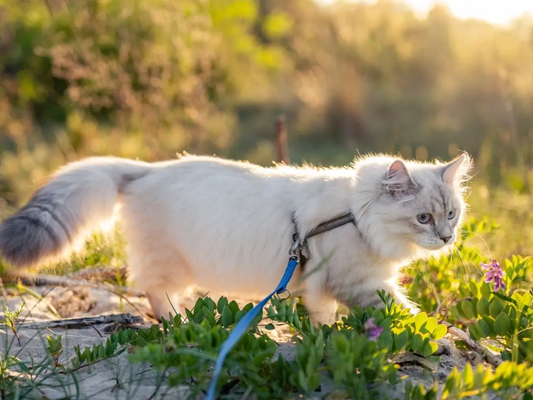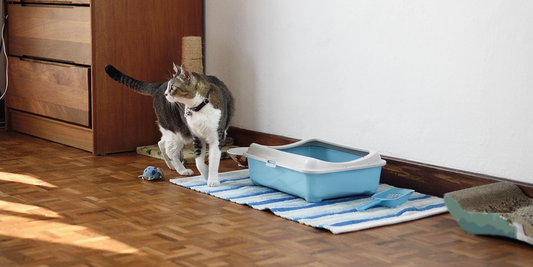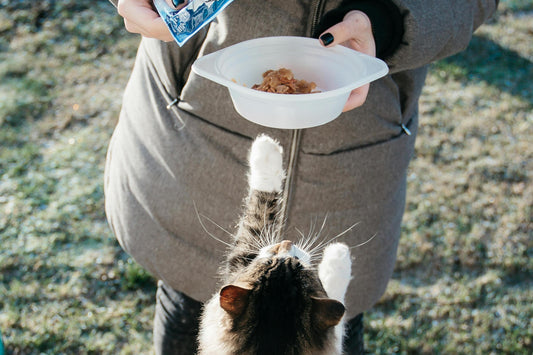Introduction:
Understanding your cat's behavior is crucial for providing optimal care and addressing any unusual habits they may exhibit. One such behavior that often perplexes cat owners is their tendency to eat litter. In this comprehensive guide, we delve into the reasons why cats engage in this behavior and provide actionable tips to address it effectively. From underlying health issues to environmental factors, we unravel the mystery behind why your cat is eating litter.
Why Is My Cat Eating Litter?
Cats are known for their curious and sometimes quirky behavior. However, when it comes to eating litter, there are several potential reasons behind this puzzling habit. Let's explore some of the common explanations:
Stress and Anxiety:
Cats are sensitive creatures, and changes in their environment can trigger stress and anxiety. In response to these emotions, some cats may resort to unusual behaviors such as eating litter as a coping mechanism.
Stressors such as moving to a new home, changes in routine, or the presence of a new pet can all contribute to feelings of anxiety in cats, leading them to seek comfort in unconventional ways.
Nutritional Deficiencies:
A lack of essential nutrients in your cat's diet could prompt them to seek out alternative sources of sustenance, including eating litter. Ensure that your cat is receiving a balanced and nutritious diet tailored to their specific needs to mitigate this risk.
Medical Conditions:
Underlying medical issues can also prompt cats to eat litter. Conditions such as feline pica, which involves the consumption of non-food items, or gastrointestinal disorders may manifest in this behavior. Consulting with a veterinarian is essential to rule out any potential health concerns and devise an appropriate treatment plan.
Exploratory Behavior:
Cats are natural hunters and explorers, and they often use their senses to investigate their surroundings. In some cases, eating litter may stem from a cat's innate curiosity, as they explore different textures and tastes within their environment.
Attention-Seeking Behavior:
Like humans, cats crave attention and interaction from their owners. If your cat feels neglected or bored, they may engage in attention-seeking behaviors such as eating litter to garner your attention. Providing ample stimulation and enrichment opportunities can help alleviate this behavior.
Environmental Factors:
The type of litter you use and its texture may influence your cat's propensity to eat it. Some cats may be drawn to certain types of litter due to their scent, taste, or texture. Experimenting with different litter options can help identify if environmental factors are contributing to this behavior.
Solutions and Strategies:
Addressing your cat's litter-eating behavior requires a multi-faceted approach that takes into account their physical and emotional well-being. Here are some strategies to consider:
-
Consult with a Veterinarian: Schedule a thorough examination with your veterinarian to rule out any underlying medical conditions and discuss potential treatment options.
-
Provide Nutritious Food: Ensure that your cat's diet meets their nutritional requirements and consider consulting with a veterinarian or feline nutritionist for personalized recommendations.
-
Minimize Stressors: Identify and mitigate sources of stress in your cat's environment, such as loud noises, changes in routine, or conflicts with other pets.
-
Enrichment Activities: Keep your cat mentally and physically stimulated with interactive toys, puzzle feeders, and designated play sessions to prevent boredom and reduce the likelihood of attention-seeking behaviors.
-
Litter Selection: Experiment with different types of litter to find one that is appealing to your cat while also being safe for consumption. Avoid litters with potentially harmful additives or fragrances.
FAQs about Why Cats Eat Litter:
-
What should I do if I catch my cat eating litter? If you observe your cat eating litter, intervene immediately to prevent them from ingesting potentially harmful substances. Redirect their attention to a safe and engaging activity, and consult with a veterinarian if the behavior persists.
-
Is it normal for cats to eat small amounts of litter? While occasional ingestion of small amounts of litter may not be cause for alarm, persistent or excessive consumption warrants further investigation. Monitor your cat's behavior closely and consult with a veterinarian if you have concerns.
-
Can eating litter harm my cat? Ingesting litter can pose various risks to your cat's health, including gastrointestinal obstruction, toxicity from ingested substances, and dental issues. Prompt veterinary attention is crucial if you suspect your cat has consumed litter.
-
How can I discourage my cat from eating litter? Implementing environmental enrichment, providing a balanced diet, and addressing underlying stressors can help discourage your cat from eating litter. Additionally, offering alternative outlets for exploration and ensuring access to clean litter boxes can minimize the likelihood of this behavior.
-
Should I switch to a different type of litter? Experimenting with different types of litter may help deter your cat from eating it, especially if they show a preference for certain textures or scents. Opt for litters made from natural, non-toxic materials and avoid those with added fragrances or chemicals.
-
When should I seek veterinary advice for litter-eating behavior? If your cat's litter-eating behavior is frequent, excessive, or accompanied by other concerning symptoms such as vomiting, diarrhea, or lethargy, seek prompt veterinary attention. A thorough examination can help identify any underlying medical issues and guide appropriate treatment.
Conclusion:
Understanding why your cat is eating litter is the first step towards addressing this behavior and ensuring their health and well-being. By considering factors such as stress, nutrition, and environmental enrichment, you can implement effective strategies to discourage this habit and promote a happy and healthy lifestyle for your feline companion.
Stay vigilant, prioritize your cat's welfare, and seek professional guidance when needed to navigate this common yet concerning behavior with confidence.








